
AFTD staff recently joined local FTD advocates at events in New York and California to support state lawmakers working to raise awareness and provide accurate data on the FTD diagnosis rate.
AFTD CEO Susan L-J Dickinson and FTD advocate Emma Heming Willis were present for both events. In February 2023, Ms. Willis and her family announced that her husband, the actor Bruce Willis, is living with an FTD diagnosis.

N.Y. State Sen. Michelle Hinchey introduces her FTD registry bill to the media at a May 15 event in Albany.
New York’s FTD Registry Bill
N.Y. State Senator Michelle Hinchey introduced a bill calling for the creation of a statewide registry of FTD diagnoses at a public media event in Albany on May 15.
While the bill passed the state Senate unanimously on June 5, the state’s legislative session ended before an Assembly vote. The Assembly counterpart to Sen. Hinchey’s bill was submitted to the chamber’s Health Committee in late April, and remained stalled there when the legislative session expired.
Nevertheless, FTD advocates say that the Senate’s passing the bill is a victory worth celebrating. “This is a big step forward for New York’s efforts to create an FTD registry, which would ensure more accurate data on the rate of FTD diagnoses in the state,” said AFTD Director of Advocacy and Volunteer Engagement Meghan Buzby. “We thank the many FTD advocates in New York who have supported Sen. Hinchey by urging their legislators to advance the bill to this point.”
Senate Bill 7874 would have required healthcare providers in New York to report diagnoses of FTD to a registry managed by the state Department of Health. The bill also would have directed the Department of Health to create an FTD registry advisory committee to help establish data collection protocols and assist with the creation and publication of annual reports to keep legislators and the governor apprised of the state of FTD across New York.
“New York is on the cusp of making history in our fight for a world without FTD,” Sen. Hinchey said. “This bill has turned hope into action for so many people and families impacted by FTD, and this momentum we’ve gained will help drive our work next session to make the country’s first FTD community Research Registry law in the State of New York.”
A prominent and passionate advocate for families affected by FTD, Sen. Hinchey delivered the Keynote Address at the 2024 AFTD Education Conference in Houston.
New York’s legislature reconvenes in January. “FTD advocates in New York will keep up the pressure on lawmakers to continue to support this important legislation,” Buzby said. “We believe that the governor will have a bill on her desk at some point in 2025.”

L-R: FTD advocate Wanda Smith, Calif. Assemblymember Brian Maienschein, AFTD CEO Susan L-J Dickinson, FTD advocate Emma Heming Willis, Calif. State Sen. Brian Jones
California’s FTD Awareness Week Resolution
AFTD staff traveled to Sacramento on May 30 to commemorate the adoption of a resolution proclaiming Sept. 22-29 FTD Awareness Week in California.
The resolution was introduced to the Assembly by Brian Maienschein, an assemblymember representing San Diego, and to the state Senate by its minority leader, Brian Jones.
California’s FTD Awareness Week coincides with World FTD Awareness Week, a globally focused event organized each year by World FTD United, an international coalition of FTD-focused groups that includes AFTD.
While in Sacramento, AFTD staff and Ms. Willis met with Gov. Gavin Newsom and other state lawmakers to highlight other concrete steps California can take to support families living with FTD, including adding an FTD advocate to the state’s Alzheimer’s Disease and Related Disorders Advisory Committee, and including FTD in the California Neurodegenerative Disease Registry, which tracks diagnoses of neurodegenerative conditions.
“FTD is a devastating disease that robs people of their best years and has a huge financial and emotional impact on families,” Ms. Willis said. “I really encourage doctors, policymakers, and the public to learn about FTD and support efforts to find treatments and a cure.”
FTD advocate Wanda Smith was also on hand for the resolution’s adoption. She has been a tireless FTD advocate since her mother’s diagnosis in the 1980s.
Raise FTD Awareness in Your Community!
Anyone can be an FTD advocate. AFTD has developed toolkits containing everything you need to urge your state, city, or town to formally recognize the upcoming World FTD Awareness Week, via a resolution or proclamation. (A resolution is a non-legal declaration designating a period of time to commemorate an event or cause, while a proclamation is an official public statement that may not require a legislative vote.)
You can make this happen! First, let us know your interest by contacting advocacy@theaftd.org. Then visit AFTD’s Advocacy Action Center (theaftd.org/get-involved/advocate) to download our Resolution and Proclamation Toolkits.
How State FTD Registries Differ from the FTD Disorders Registry
Despite sharing the word “registry,” the proposed New York FTD registry differs significantly from the existing FTD Disorders Registry. The former would require clinicians to report all new FTD diagnosis – an important first step to establishing FTD’s actual prevalence in the state. The FTD Disorders Registry, meanwhile, is global in scope, and relies on voluntary participation from persons diagnosed and their loved ones, thus ensuring their lived experiences are incorporated into FTD research. Join the FTD Disorders Registry by visiting FTDregistry.org.
AFTD Sponsors and Attends Inaugural Alter Dementia Summit
In April, AFTD staff joined the inaugural Alter Dementia Summit in Decatur, Ga., to converse with key opinion leaders – including African American faith leaders, people living with dementia and their care partners, researchers, and healthcare professionals – about ways to further FTD awareness in the African American community. Founded in 2019, Alter Dementia works in collaboration with faith-based congregations to foster greater understanding of neurodegenerative diseases such as FTD, and to advocate for inclusive, dementia-friendly environments. Its founder, Fayron Epps, PhD, RN, is a member of AFTD’s Medical Advisory Council and contributed to a 2023 issue of AFTD’s Partners in FTD Care newsletter on Black/African Americans and FTD. AFTD was a community sponsor of the Alter Dementia Summit.
Strategic Planning for AFTD’s 2025-2028 Fiscal Years to Begin
AFTD has begun its strategic planning process for the next three fiscal years spanning July 2025 through June 2028. Over the next 12 months, AFTD staff will engage with key stakeholders for their input in how the organization can better serve our community and further our vision of hastening a future free of FTD. Their input will be synthesized into a set of goals that AFTD will endeavor to accomplish over the next three years; these goals will be published in detail on the AFTD website next year. AFTD has used strategic planning to guide its work since 2009. Visit theaftd.org/about-us/strategic-plan to read previous AFTD Strategic Plan documents.
“The hard part is you have to manage all these buckets of stuff, both doctor’s appointments and trying to keep your mind healthy.”
– Brian Dowden, who is living with FTD
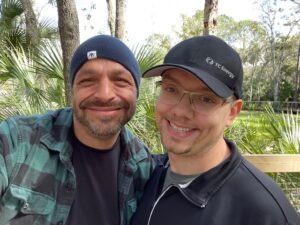
Brian (left) with his partner Tony
In 2020, when Brian Dowden was in his late 30s, he noticed changes in his cognitive abilities while preparing to take the licensing exams required by his profession. “It was supposed to be an easy test for the most part,” he said. “I started studying and immediately began to struggle. I just couldn’t retain the information.”
Eventually, Brian was dismissed from his job as an operations manager, where he oversaw case managers and financial assets. After transitioning to a new company and position, where he led a team of managers and more than 200 employees, Brian continued to struggle with meeting deadlines and remembering his coworkers’ names.
This frustrating experience motivated Brian to visit his primary care physician, who referred him to a neurologist. “I went through initial testing, and after returning six months later, my scores decreased. She recommended an MRI, which turned into me getting a PET scan and a spinal tap, and that’s when I found out.”

Brian (left) with his mother, Dory Bailey Walton, who is also his care partner
In 2023, Brian was diagnosed with FTD at age 45. “My neurologist gave me a packet and I filled out a card to join AFTD’s email distribution list, and that’s how I began to learn more about FTD,” he said.
As his symptoms progressed, Brian realized he needed to “downsize and minimize stress.” He sold his home in Ohio and moved to Florida to live with his mom and stepfather, Dory and Barry Walton. As Brian’s care partners they help him manage the many challenges that come with the disease. “The stuff I could do just a month ago, compared to now, is very different. It’s nice to be able to hear and read stories from others going through this.”
In addition to using AFTD’s website to learn about the disease, our Comstock Quality of Life Grant and Comstock Respite Grants have provided Brian and Dory with vital support and helped them “manage the stress and financial burden of living with FTD.”
Will you make a gift today to support people living with FTD like Brian?
A donation of $500 can fund one Comstock Grant, while any amount will help improve the quality of life for those who are affected by a diagnosis, as well as drive research to a cure. Use the enclosed envelope, visit theaftd.org and click on the Donate+ button on the top of the page or click here.
Together, we can support all on this journey.
Together, we are empowered to #endFTD.
 Valerie Snow has had a busy year. In the past 12 months she has gotten married, bought a house, and, in May, traveled to Houston for her first AFTD Education Conference. Hearing from the many researchers hard at work on FTD treatments and connecting with others who understand FTD was “really energizing,” she said. “It made me feel much less alone and more hopeful, when before I didn’t have much hope.”
Valerie Snow has had a busy year. In the past 12 months she has gotten married, bought a house, and, in May, traveled to Houston for her first AFTD Education Conference. Hearing from the many researchers hard at work on FTD treatments and connecting with others who understand FTD was “really energizing,” she said. “It made me feel much less alone and more hopeful, when before I didn’t have much hope.”
Snow achieved another milestone in Houston when she officially joined the AFTD Board. “It feels like a new chapter in my life,” she said. And although Snow did not find the organization until 2023 – three years after her father, James T. Snow, died at age 68 – she said, “I know I’m always going to support AFTD.”
James was a turfgrass scientist who, before his diagnosis of primary progressive aphasia, spent 35 years working for the United States Golf Association. A passionate outdoorsman and environmentalist, he spent much of his career directing USGA’s efforts to make golf more ecologically sustainable. “I’m proud of that,” said Snow, herself an avid naturalist who took up birding during the pandemic.
Snow was just a teenager when her father was diagnosed. “I felt like I was completely alone at that age with a parent with dementia,” she said. “It’s a really challenging form of dementia – heartbreaking for the person [diagnosed] and for their family.” James traveled a lot for work; Snow said that her favorite memory of her father was accompanying him on a work trip to California – “really the only time I spent one-on-one with him” before he began showing symptoms, she said. By her home-office desk, she keeps a framed photo of her and her dad on that trip, smiling together with Monterey Bay unfolding behind them.
A lawyer at Philadelphia’s SeniorLAW Center, where she provides free legal services for older adults in Pennsylvania, Snow will serve on the AFTD Board’s Audit, Governance, and Policy & Advocacy committees. She joins AFTD as the organization launches its strategic-planning process for the three-year period beginning in July 2025. Snow said she looks forward to helping AFTD mature and “grow into its new, bigger-sized pants.”
Snow said she wished she had known about AFTD during her father’s FTD journey; she would have benefited from the sense of community and hope that AFTD offers, she said. “The perception [of FTD] is there’s basically nothing you can do, and doctors will tell families that and send you on your way,” she said. But thanks to AFTD, she said, “you don’t have to do it alone.”
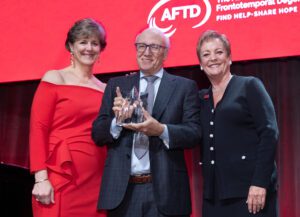
(L-R) AFTD CEO Susan L-J Dickinson, Dr. Bruce Miller, former AFTD Board Chair Beth Walter
The eighth annual AFTD Hope Rising Benefit, held April 4 at New York City’s Ziegfeld Ballroom, raised more than $1.9 million to support AFTD’s mission of helping those affected by FTD and driving research toward a cure.
Bruce Miller, MD, the director of the Memory and Aging Center at the University of California, San Francisco, received the Susan Newhouse & Si Newhouse Award of Hope for a career spent supporting all those affected by FTD. A founding member of the AFTD Medical Advisory Council, Dr. Miller is a globally recognized expert in diagnosing FTD and managing care coordination for persons diagnosed and their care partners.
In his speech, Dr. Miller sounded an appropriately hopeful note for the future of FTD research and treatment development to the more than 400 Hope Rising attendees.

The Gonzalez-Morett sisters, Diana and Sandra, delivered the evening’s keynote address
“In slightly more than 20 years, AFTD has become a powerful force, changing science and changing care for people with FTD,” Dr. Miller said. “From a rare and undiagnosable condition, today FTD is an illness that is driving the world of neuroscience. I believe that the first powerful treatments for neurodegenerative diseases will come out of our highly creative and innovative field.”
Delivering the event’s keynote address were sisters Sandra and Diana Gonzalez-Morett, who spoke movingly about their late mother’s FTD diagnosis, its effect on their family, and the currently unmet need for quality, affordable dementia care.
“Most families dealing with FTD face an average economic burden of $120,000 each year, almost twice the economic burden of Alzheimer’s,” Diana said. “Along with the fact that access to programs, training, education, and respite care were hard to navigate. And, on top of all that, FTD continued to be cruel and unforgiving.”
Hope Rising attendees watched a clip from the sisters’ movie Pedacito De Carne, which was inspired by their personal
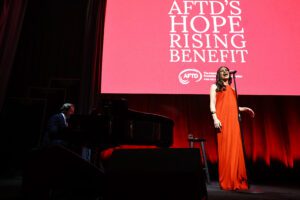
Lea Michele provided the evening’s entertainment
experiences with FTD. Sandra served as associate producer, while Diana wrote and starred in the short film.
Lea Michele provided the evening’s entertainment. Coming off her critically acclaimed Broadway run as Fanny Brice in Funny Girl, Michele delivered performances of “Don’t Rain on My Parade,” from Funny Girl, as well as “If You Knew Susie,” which has become a Hope Rising tradition. Written in 1925, “Susie” has been sung at each Hope Rising in honor of Susan Newhouse, the late wife of AFTD Board member Donald Newhouse.
Mr. Newhouse served as Benefit chair, along with co-chairs Anna Wintour (editor-in-chief, Vogue) and David Zaslav (CEO and president, Warner Bros. Discovery). Joan Berlin and AFTD Board member Kathy Newhouse Mele served as vice chairs.
All funds raised at Hope Rising will go toward fueling AFTD’s mission. Leading supporters of Hope Rising include Bank of America, Judy and Leonard Lauder, the Samuel I. Newhouse Foundation, and Warner Bros. Discovery.
“We are grateful for the generosity of our donors, without whom we would be unable to fund critical studies aimed at finding treatments for FTD,” AFTD CEO Susan L-J Dickinson said. “Together, with our funders, we are empowering researchers to better understand the underpinnings of this devastating disease and supporting families on their journeys.”

Olga Uspenskaya, MD, PhD, Vice President of Clinical Development at Prevail Therapeutics
Recently, Prevail Therapeutics presented interim results from their Phase 1/2 open-label clinical trial assessing the safety and efficacy of their gene therapy to raise progranulin levels in people with FTD-GRN. Not only was the treatment generally safe and well-tolerated among participants, but progranulin levels in the cerebrospinal fluid increased immediately following a one-time administration and remained at normal or above-normal levels after 12 months.
Concurrently, the trial also evaluated a product of lysosomal lipid metabolism – a process believed to be implicated by deficient progranulin levels and significant to FTD pathology – as an indicator, or biomarker, of PR006’s efficacy in not only restoring progranulin levels but amending downstream processes. Trial data show that this biomarker, which can be collected via urinalysis, may reflect lysosomal dysfunction, and therefore indicate disease. More research is required to understand if restoring progranulin and downstream processes meaningfully impacts FTD symptoms.
AFTD spoke with Prevail Therapeutics Vice President of Clinical Development Olga Uspenskaya, MD, PhD, about this intervention, empowering the FTD community, and the current state of FTD research. The conversation below has been edited and condensed.
What approach is your company using to treat FTD?
Our intervention, PR006, is designed to treat the root cause of FTD-GRN, which is caused by a mutation that results in progranulin deficiency, by delivering a healthy gene through a one-time injection using well-established viral vector technology. By this method, we hope to get an individual’s body to produce and restore healthy levels of progranulin – critical for normal functioning of the brain – thereby preventing or slowing down neurodegeneration. Our approach is directed at the source of the disease’s pathology.
What role do you hope you and your colleagues play in empowering the FTD community?
I think we can contribute to educating the general population, the patient community, and medical professionals. We all need to understand there is a lot of stigma associated with FTD, which we need to come together to address, enabling people to get an accurate diagnosis so they can seek help earlier.
As there is more collaboration among stakeholders, it should also be our mission to work together and foster precompetitive partnerships to discover and develop FTD biomarkers, which will open the door for future treatments and early diagnosis of sporadic forms of the disease. Right now, I believe we are in good shape to diagnose someone when a genetic cause can be found, but without robust biomarkers for subtypes, we’ll never be able to improve diagnosis in cases of sporadic FTD.
What is most encouraging about today’s research landscape?
I am amazed by how quickly FTD research has increased, though I’m not sure the field was prepared for the growth. It’s great to see, but we must work together to overcome shared challenges such as patient recruitment and access to genetic testing. [AFTD strongly encourages anyone considering genetic testing to first consult with a genetic counselor. Learn more at theaftd.org/ftd-genetics/genetics-counseling.]
Currently, with so many clinical trial options available, there are multiple shots on goal for FTD-GRN, which is encouraging because what we’re seeing for people affected by one form of FTD will hopefully be replicated for others who are living with the C9orf72 and MAPT variants, as well as people with sporadic forms of the disease.
Hundreds of people whose lives have been affected by FTD traveled to Houston, Texas for AFTD’s 2024 Education Conference on May 3 for a day spent learning from and engaging with others who understand the FTD journey.
Presented by a range of FTD experts, the Conference’s sessions encompassed the breadth of AFTD’s mission areas: advocacy and awareness, research and support. In addition to the nearly 300 members of AFTD’s community who attended in person (despite inclement weather in the Houston area), an additional 700-plus attended virtually via livestream.
Members of AFTD’s Persons with FTD Advisory Council kicked off the Conference with a discussion of the stigma that many persons diagnosed experience. Highlighting the need for more widespread FTD education, Council Co-Chair Sandy Howe said, “I wish that others could understand how hard I’m working to try to keep up with conversations, to answer questions, and to maintain ‘normal’ behavior.”
New York State Senator Michelle Hinchey delivered the day’s Keynote Address. A passionate FTD advocate whose late father, former U.S. Congressman Maurice Hinchey, was diagnosed with primary progressive aphasia, Sen. Hinchey spoke about her
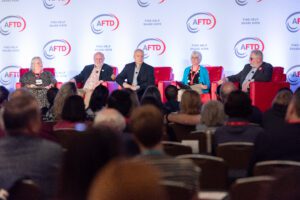
ongoing efforts to introduce bills that will meaningfully advance FTD research and awareness in New York State. (See cover story to learn more.)
“For me, this fight has always been personal — it started the moment my dad was diagnosed — and I’m proud to be able to use my platform to raise awareness and push legislation that will give us a better understanding of this terrible disease in the hopes of eradicating it once and for all,” Sen. Hinchey said.
A conversation between AFTD CEO Susan L-J Dickinson and FTD advocate Emma Heming Willis brought the day to a close. Willis spoke movingly about her family’s decision to publicly announce the FTD diagnosis of her husband, the actor Bruce Willis, in 2023.
“I never wanted our daughters to think that this was some kind of family secret,” she said. “I wanted them to see us raise awareness on a global scale, because that’s the kind of reach their father has. And I know that he would want us to do that.”
Other sessions throughout the day focused on how to talk to family members about FTD genetics, the uses and limitations of neuroimaging, and the link between lifestyle choices and brain health. Most sessions were recorded and are available to watch on AFTD’s YouTube channel (youtube.com/theAFTD).
neuroimaging, and the link between lifestyle choices and brain health. Most sessions were recorded and are available to watch on AFTD’s YouTube channel (youtube.com/theAFTD).
In-person attendees could choose to take part in a range of activities, including social events for young adults and persons diagnosed and their care partners, as well a special “FTD and the Arts” exhibition.
Of the 1,017 total attendees (in-person and virtual), approximately one-third were healthcare professionals. Additionally, 74 attendees said they were living with an FTD diagnosis. Attendees hailed from 49 states plus Washington D.C., as well as 12 countries outside the U.S.
The AFTD 2025 Education Conference is scheduled to take place on May 2, outside Denver, Colo. Stay tuned to AFTD’s website and social media channels for more information.
In recent months, AFTD has awarded grants to scientists working on the leading edge of FTD research through three initiatives: the Pathways for Hope Pilot Grant program; the Accelerating Drug Discovery for FTD program, in partnership with the Alzheimer’s Drug Discovery Foundation (ADDF); and the Digital Assessment Tools for FTD and ALS program, in partnership with the ALS Association.
Pathways for Hope Pilot Grants target early-career researchers carrying out discovery research that is the first step in advancing promising science from the lab to the clinic. In May, AFTD announced the two newest grant recipients. Zevik Melamed, PhD, a group leader in the department of medical neurobiology at the Hebrew University of Jerusalem, will use a novel approach called synthetic biology to study disruptions in the way genes are translated into proteins in brain cells carrying the FTD-causing variant of the gene C9orf72. And Zachary McEachin, PhD, an assistant professor at Emory University, will analyze the entire set of proteins produced by brain cells – known as the proteome – to identify protein “signatures” in genetic forms of FTD caused by excessive accumulations of TDP-43, a specific type of protein. Dr. McEachin’s Pilot Grant is co-funded by AFTD and the Milburn Foundation.
Since 2007, AFTD and ADDF have partnered to support preclinical research on promising new FTD drugs through the Accelerating Drug Discovery for FTD initiative. Its latest grant recipient is Jeffrey Rothstein, MD, PhD, a professor of neurology and director of the Robert Packard Center for ALS at Johns Hopkins University.
Dr. Rothstein and his team will evaluate a novel therapeutic to correct a problem at the heart of FTD associated with the accumulation of the protein TDP-43 – the abnormal relocation of TDP-43 from the nucleus of brain cells to the surrounding cell matrix.
Finally, in 2023, AFTD and the ALS Association partnered to offer a new grant program, Digital Assessment Tools for FTD and ALS, and are proud to announce two awards supported through this funding opportunity. Adam Staffaroni, PhD, an associate professor at the University of California, San Francisco’s Memory and Aging Center – along with collaborators from UCSF, Columbia, Massachusetts General Hospital, and Washington University at St. Louis – will evaluate a smartphone app developed for use in the ALLFTD natural-history study in participants enrolled in the PREVENT ALS study of genetic ALS. The combined dataset will allow the team to confirm the reliability and validity of the app in ALS and to determine the benefit of remote data collection for early detection and monitoring disease progression in people with disease-associated gene variants.
Ashkan Vaziri, PhD, who heads the digital technology company BioSensics, will collaborate with AFTD Medical Advisory Council chair-elect Chiadi Onyike, MD at Johns Hopkins to test Biosensics’s patented PAMSys wearable sensor and the accompanying data platform, BioDigital Home, in people with frontotemporal dementia and corticobasal syndrome. Data from his study will help identify the digital measures best suited to monitoring disease progression in FTD and ALS.

AFTD Meet & Greet events provide the rare and valuable opportunity to interact with others who understand FTD. Typically hosted by AFTD’s incredible volunteers, Meet & Greet events take place either in person or virtually, and can help combat the feelings of isolation and loneliness that so often accompany an FTD diagnosis.
FTD’s isolation can be especially pronounced for those who are in a more marginalized demographic group, with fewer supports in place to address their particular challenges. Those challenges can result from socioeconomic disparities, a lack of available healthcare options, and cultural and societal stigma.
AFTD has been working to address the needs of these communities. In recent months, AFTD staff and volunteers have led three national Meet & Greet events for members of our community who speak Spanish, are college-aged, and identify as LGBTQIA+.
On May 15, four AFTD volunteers hosted AFTD’s first-ever Meet & Greet conducted entirely in Spanish. Attendees joined the virtual event from Miami to San Francisco for a lively discussion. Following the Meet & Greet, AFTD Ambassador Sandra Gonzalez-Morett, one of the event hosts, passed along a comment she received from Yasmín, an attendee from Puerto Rico:
“Acerca de la conferencia, debo felicitarlos. Fue muy interesante y de mucha ayuda conocer los recursos disponibles a través de AFTD. Fue gratificante identificarse con las experiencias por las que han pasado o están pasando otras personas en diferentes partes del mundo. Espero que pronto se pueda repetir.*
On June 15, two college-aged AFTD volunteers, Julia Mitchell and Liz Matthews, facilitated a national Meet & Greet to talk about the particular challenges faced by younger people who have a parent diagnosed with FTD. Younger adults in this situation often feel overwhelmed, as they are busy attending school and launching their careers while struggling to provide FTD care. Attendees also discussed how growing up with a parent who has been diagnosed with FTD affected their own development. Julie and Liz aim to establish a national AFTD support group specifically for young adults.
Finally, two AFTD staff members, Support Services Coordinator Erin Ficca and Advocacy and Volunteer Engagement Assistant Lauren Pelaia, led a national Meet & Greet for the LGBTQIA+ community on June 20. While FTD presents its own stigma, people who identify as LGBTQIA+ must fight the stigma associated with their very identities.
AFTD pledges to continue supporting everyone facing FTD. We are proud of our generous volunteers who step forward to offer help. If you are interested in hosting a Meet & Greet – whether for a specific group or for the FTD community in general – please reach out! We would love to hear from you. To learn more, visit theaftd.org/get-involved/volunteers-network.
AFTD honored its volunteers at a special reception in Houston, Texas, held the night before AFTD’s 2024 Education Conference.
AFTD staff and Board mingled with AFTD volunteers from across the country while enjoying tasty hors d’oeuvres and beverages. During the reception, AFTD Volunteer Services Manager Michael Mullan presented a special video highlighting the incredible impact that AFTD volunteers have made in the past year – increasing awareness, educating healthcare professionals, advocating for better FTD supports, and raising funds to hasten AFTD’s vision of a future free of FTD.
“AFTD would not function without our driven, determined volunteers,” Mullan said. “Their enthusiasm and resolve in the face of FTD inspires our staff to work harder every day.
Our volunteers do so much to serve our community and achieve our shared mission. Being able to recognize them in person was truly an honor.”
Before the reception, AFTD’s volunteer Ambassadors convened for a summit, where they spoke about ways to further advance AFTD’s mission. Ambassadors are AFTD’s volunteer leaders; they work in their communities to raise FTD awareness of FTD through networking, outreach, and speaking engagements, and by representing AFTD at various events and conferences.
Every single AFTD volunteer displays admirable courage and passion. To all our remarkable volunteers: thank you!
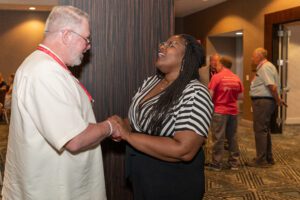



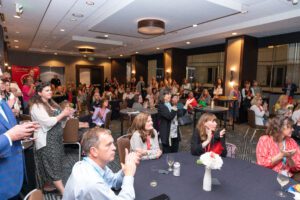
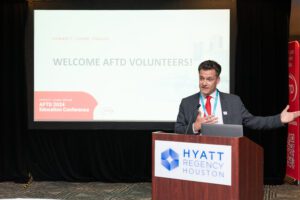
Independent Events:
Shipping Up to Boston:
Bennett Raphel earned a hard-won entry to the coveted Boston Marathon, held April 15, through his employer, Point32Health. He raised funds for AFTD’s mission as his designated charity in memory of his mother-in-law, Carol Finkle, who was diagnosed with FTD and died in October 2023. He raised a total of $2,911 between race donations and a fundraising trivia event at Hopothecary Ales, a local brewery.
Race for the Prize:
Naomi Reynolds hosted the CB for CBD 5K on August 12, 2023, at Horsham Park in Pennsylvania in honor of her father, Bob Faust, who is currently living with CBD. With the support of her friends and colleagues, she raised $2,198 to further AFTD’s mission.
The Warrior (Pose):
Michelle Greco held a fundraising yoga class at Peace Power Soul Fitness in Easton, Mass. in October 2023. This event was held in memory of Michelle’s mother, Pam Duncan, who was diagnosed with FTD and died at age 69. Michelle raised $2,112 to advance AFTD’s mission.
Dancing in the Street:
Angelique Bolding celebrated her the memory of her mother, Madonna Bailey, through one of her biggest joys in life: Motown music. “Motown Memories: A Soulful Night for Dementia Support” took place in November 2023. Amid much laughter and love, $2,005 was raised to support AFTD’s mission, and an unmeasurable amount of awareness was spread.
I Am Woman:
Meredith Burns hosted a highly educational panel event in memory of her mother, Ellen, in February in New York City. During the event, “Does Womanhood Live in the Body or the Brain?”, several healthcare professionals specializing in women’s health shared their knowledge, along with FTD education and awareness. The night raised $2,000 to further AFTD’s mission.
Hit Me with Your Best Shot:
Kimberly Stasa involved her coworkers and the students at the Nazareth Area High School in Pennsylvania by challenging them to take part in the Hot Shot Challenge in memory of her husband, Jeffrey, who died in 2020 following his FTD-ALS diagnosis. A total of $1,531 was raised to advance AFTD’s mission during this December 2023 event.
Electric Feel:
Rich Nesin held a memorial birthday party for his long-time friend, Scott Kempner, at the Bowery Electric in New York City in February. Friends and fans from all over came out and celebrated in true rock-and-roll fashion, raising $1,500 to support AFTD’s mission.
Red Red Wine:
Brooke Sepelak participated in the Wineglass Marathon in Corning, N.Y. on October 1, 2023, in memory of her mother, Kelly, who was diagnosed with FTD and died in 2021. Brooke raised $1,104 to advance AFTD’s mission and spread an unmeasurable amount of awareness all along the 26.2-mile course.
Rockin’ Around in NYC:
Dr. Stephanie Fagin-Jones’s son Alexander hosted a series of small concerts throughout New York City and in Central Park in March to raise money for AFTD in honor of his grandfather, Richard, who was diagnosed with primary progressive aphasia. Alexander sang and played the piano; their concerts raised a total of $1,000.
A Thank You from AFTD’s Events Department
We are deeply grateful and pleased to announce that during our 2024 fiscal year (July 1, 2023 – June 30, 2024), our volunteer-led fundraisers raised a total of $840,000 to advance AFTD’s mission! This is an incredible accomplishment and a testament to the dedication, passion, and hard work of our fundraising volunteers, who have tirelessly committed themselves to this cause.
Over the past year, we have witnessed a diverse array of uniquely impactful fundraising events. From exhilarating marathons and spirited golf tournaments to intimate themed parties and virtual events, our fundraising volunteers have all demonstrated exceptional creativity and determination. Every event has contributed significantly to the impact we’re able to make as an organization, raising funds for our mission and increasing awareness of FTD.
From AFTD’s Events Department – and on behalf of all of us at AFTD and the community we serve – we want to extend our heartfelt thanks to all our incredible fundraising volunteers who are driving our mission forward. Your unwavering dedication and hard work are truly inspiring, and we could not be where we are today without you! Thanks to your efforts, you’ve not only helped raise vital funds, you’ve fostered a sense of community and hope among those affected by FTD. Your efforts have made a tangible impact, bringing us closer to a world without this terrible disease. It is both an honor and a privilege to work alongside you, and we are eagerly anticipating all the amazing achievements you will bring to your future fundraisers.
As we look ahead to the coming year, we are filled with optimism and excitement. We know that with your continued support and dedication, we will achieve even greater milestones together. Thank you for being the heart and soul of our mission. Together, we are empowered to end FTD.
